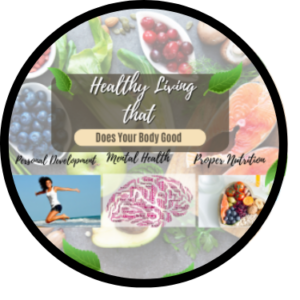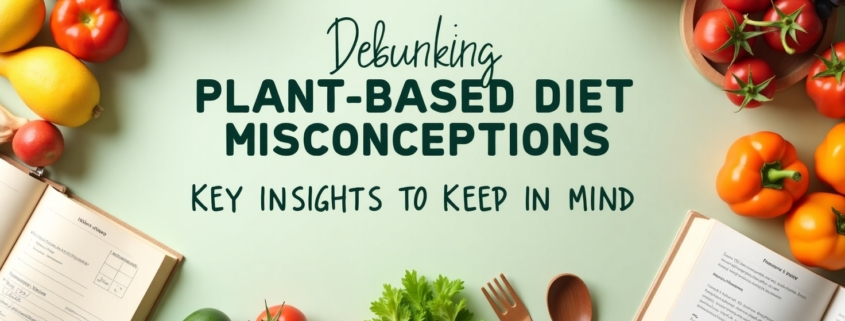Debunking Plant-Based Diet Misconceptions: Key Insights to Keep in Mind
Health & Wellness SpecificIn recent years, plant-based diets have gained considerable popularity, praised for their health benefits, positive environmental impact, and ethical considerations regarding animal welfare. From athletes to everyday individuals, more people are embracing plant-based eating in various forms, whether through vegetarianism, veganism, or reducing animal product consumption with a flexitarian approach. However, despite the growing awareness and enthusiasm around plant-based diets, many misconceptions still persist. These misconceptions can create confusion and lead some people to shy away from a plant-based lifestyle.
In this blog post, we’ll debunk common myths surrounding plant-based diets, offer evidence-based insights, and provide helpful resources for anyone curious about adopting a plant-based approach to eating.
1. “Plant-Based Diets Lack Sufficient Protein”
One of the most widespread misconceptions about plant-based diets is that they lack adequate protein. This belief stems from the idea that animal products like meat, eggs, and dairy are the only complete and reliable sources of protein. While it’s true that animal products contain all nine essential amino acids in one package, plants offer plenty of protein too—and you don’t have to combine different plant sources at every meal to get all the amino acids.
Reality: Many plant-based foods are excellent sources of protein, including beans, lentils, tofu, tempeh, quinoa, chia seeds, nuts, and whole grains. For instance, one cup of cooked lentils contains 18 grams of protein, while a serving of tofu provides around 10 grams. According to the *American Dietetic Association*, a well-planned plant-based diet can meet protein needs for people of all ages, including athletes.
In fact, a study published in the *Journal of the Academy of Nutrition and Dietetics* shows that most people in Western countries consume more protein than needed, often exceeding the recommended dietary allowance (RDA). A well-rounded plant-based diet can easily meet or exceed protein requirements without relying on animal products.
Additional Resource: Explore the *Physicians Committee for Responsible Medicine’s* guide on plant-based protein sources (https://www.pcrm.org/good-nutrition/nutrition-information/protein).
2. “Plant-Based Diets Are Nutrient Deficient”
Another common belief is that plant-based diets are lacking in vital nutrients, particularly vitamin B12, iron, calcium, and omega-3 fatty acids. The concern is that eliminating animal products can lead to deficiencies that negatively impact overall health.
Reality: While it’s true that vitamin B12 is primarily found in animal products and needs to be supplemented on a strict vegan diet, other essential nutrients are readily available in plant-based foods or can be easily obtained with fortified foods and supplements.
– Iron: Iron from plant-based sources, known as non-heme iron, is abundant in lentils, beans, tofu, spinach, and fortified cereals. While non-heme iron is less readily absorbed by the body than heme iron from meat, pairing it with vitamin C-rich foods (such as citrus fruits or bell peppers) enhances absorption.
– Calcium: Plant-based eaters can obtain calcium from fortified plant milks, leafy greens (like kale and collard greens), almonds, and tofu made with calcium sulfate. Many plant-based eaters also choose calcium-fortified orange juice or cereals to ensure adequate intake.
– Omega-3 Fatty Acids: While omega-3 fatty acids from fish are well-known, plant-based sources like chia seeds, flaxseeds, walnuts, and algae-based supplements provide ample omega-3s (specifically ALA). Algae oil supplements, in particular, provide EPA and DHA, the essential omega-3s found in fish.
According to a review published in *The Permanente Journal*, plant-based diets are not only nutritionally adequate but can also prevent and reverse chronic diseases like heart disease, type 2 diabetes, and hypertension when appropriately planned.
-Additional Resource: The *Vegan Society* offers a comprehensive guide to ensuring optimal nutrient intake on a plant-based diet (https://www.vegansociety.com/resources/nutrition-and-health).
3. “Plant-Based Diets Are Too Expensive”
A significant barrier for many people considering a plant-based diet is the perception that it’s more expensive than a traditional omnivorous diet. This belief often comes from seeing the price tags of trendy vegan products, specialty items, or pre-packaged meals at health food stores.
Reality: While it’s true that some plant-based products like mock meats, plant-based cheeses, and pre-made vegan meals can be expensive, a whole-food, plant-based diet based on staples like beans, lentils, rice, oats, and seasonal vegetables is often more affordable than one that relies on animal products.
A study by *Oxford University*, published in the journal *The Lancet Planetary Health*, found that adopting a plant-based diet could reduce food costs by up to 34% in high-income countries. By focusing on whole foods and avoiding highly processed products, plant-based eating can be both budget-friendly and nutritious.
Shopping in bulk, meal prepping, and buying in-season produce are key strategies to keep costs down while enjoying a diverse and nutrient-dense plant-based diet.
Additional Resource: Learn more budget-friendly plant-based eating tips from *Plant-Based on a Budget* (https://plantbasedonabudget.com/).
4. “You Need to Be 100% Vegan to Benefit from a Plant-Based Diet”
Another misconception is that you have to go fully vegan or vegetarian to reap the health benefits of a plant-based diet. This all-or-nothing mindset can discourage some people who feel overwhelmed by the idea of eliminating all animal products.
**Reality:** You don’t need to adhere strictly to a vegan diet to see the benefits of plant-based eating. Reducing the consumption of animal products and incorporating more whole plant foods into your diet—even in a flexitarian or “plant-forward” approach—can significantly improve health outcomes.
The *American Heart Association* emphasizes that even modest shifts toward plant-based eating can lower the risk of heart disease, lower cholesterol levels, and reduce the risk of type 2 diabetes. The Mediterranean diet, which focuses on whole plant foods with occasional fish and poultry, is another well-known example of a flexible, plant-centric eating pattern associated with longevity and heart health.
Plant-based eating is about progress, not perfection. Every plant-based meal is a step toward better health, both for yourself and the planet.
Additional Resource: For more on flexitarian diets, check out *Harvard’s School of Public Health’s* guide on plant-forward eating (https://www.hsph.harvard.edu/nutritionsource/plant-based-diet/).
5. “Plant-Based Diets Are Unsustainable for Long-Term Health”
Some people believe that a plant-based diet is difficult to maintain over time, or that it may lead to nutrient deficiencies or health issues if followed long-term.
**Reality:** A well-planned plant-based diet is not only sustainable long-term but has been shown to improve longevity and reduce the risk of chronic diseases. Research published in *The Journal of Nutrition* shows that individuals who follow plant-based diets long-term have lower rates of obesity, heart disease, hypertension, and certain types of cancer compared to their omnivorous counterparts.
Additionally, many cultures around the world—such as in the Blue Zones (regions with some of the longest-lived populations)—traditionally follow plant-based or plant-centric diets, and their populations enjoy exceptional longevity and health.
The key to long-term success with a plant-based diet is variety, balance, and ensuring you get all essential nutrients. Consulting with a registered dietitian or nutrition expert can also provide personalized guidance to support long-term health.
Additional Resource: Explore the *Blue Zones* approach to longevity and plant-based eating (https://www.bluezones.com/recipes/).
Conclusion: Plant-Based Eating Made Simple and Effective
Despite the misconceptions surrounding plant-based diets, the evidence is clear: a well-planned plant-based diet can be nutritionally adequate, affordable, and sustainable long-term. Whether you’re looking to improve your health, reduce your environmental footprint, or explore ethical eating choices, embracing plant-based meals—whether part-time or full-time—offers significant benefits.
By debunking these myths and focusing on a diverse, whole-food, plant-based approach, you can enjoy delicious, satisfying meals while supporting your overall well-being. Whether you’re already plant-based or just starting to explore the lifestyle, there are plenty of resources and support systems to help you on your journey.
Additional Resources for Deeper Exploration:
– *Plant-Based Dietitian’s* guide to the health benefits of plant-based eating (https://plantbaseddietitian.com/)
– *NutritionFacts.org* for evidence-based nutrition videos and articles on plant-based living (https://nutritionfacts.org/)
– *The China Study* by T. Colin Campbell and Thomas M. Campbell for an in-depth look at the research behind plant-based nutrition.
Empower yourself with knowledge, explore new flavors, and enjoy the journey toward a healthier and more sustainable lifestyle!



